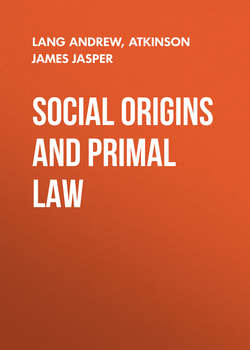Читать книгу Social Origins and Primal Law - Lang Andrew - Страница 3
CHAPTER I
THE EARLY HISTORY OF THE FAMILY
THE FAMILY. THEORY OF MR. ATKINSON
ОглавлениеThe Family is the most ancient and the most sacred of human institutions; the least likely to be overthrown by revolutionary attacks. In epochs of change the Family naturally invites the attentions of impetuous reformers, like Shelley (who advocated a scheme more than any other apt to shock the conscience of a savage), and like the friends of 'Free Love,' who would introduce a license beyond the Urabunna model. The horror aroused by certain relations, such as that of brother-and-sister marriage, is perhaps the oldest of moral sentiments, yet it has lost its hold of some barbaric races, and has been overcome by dynastic pride, as in the Royal House of the Incas of Peru, and in that of Egypt. While the Family, everywhere almost, has been secured by a religious and all but instinctive dread of certain aberrations, the laws or customs which may not be broken have varied in different lands, and in different stages of civilisation. What is incest in one age or country is innocent in another; still certain unions, varying in various regions, have always been regarded with loathing. No such emotion is known to be felt among the lower animals, and scientific curiosity has long been busy with the question, why should the least civilised of human races possess the widest list of prohibited degrees? What is the origin of the stringent laws that, among naked and far from dainty nomads, compel men and women to seek their mates outside of certain large groups of real or imagined kindred? The answers given to this question have varied with the facts of savage law which chanced to be at each moment accessible to inquirers, and all attempts to solve the problem must be provisional. New knowledge may upset even the most recent theory, and, indeed, new knowledge of the rules of certain Australian tribes has already produced fresh hypotheses, as regards certain aspects of the problem.
The whole subject is thorny, and I must crave pardon for venturing to differ, provisionally, on several important points, from authorities whose learning, research, and experience far exceed my own. The facts which they have collected from personal knowledge of savages, and from reading, often group themselves otherwise in my eyes than in theirs – the perspective is different. My observations, therefore, are submitted to criticism with all diffidence. Only the main lines of a complex discussion are here traversed, and the works cited are, as a rule, either by English-speaking authors, or, at least, are sometimes accessible in English translations. It will be seen that students have differed greatly, not only from each other, but, at different times, from themselves, under the influence of new facts brought in from the most remote and isolated of savage races. One author is most interested in this, another in that, factor of the problem. The difficulty of the subject cannot be exaggerated; for the origins of our human society cannot be historically traced behind the institutions of the races now lowest in the scale of culture. We are driven to risk hypotheses. Again, it is by no means certain that some of these lowest peoples of to-day (say the Arunta of Central Australia) represent a moment in the main current of the stream of tendency, a point through which all progress has passed. The ideas and institutions of such tribes may be mere local 'sports,' other divergencies may have arisen in other quarters, and it would be an error (repudiated by Mr. McLennan, the founder of the study in England) to suppose that, everywhere, exactly the same series of changes evolved itself in due sequence. 'In one place or another everything may have been going on,' I have heard Mr. McLennan observe.
Once more, the subject is obscure because the races apparently 'nearest the beginning,' the naked Australians, houseless hunters, just emerging from the palæolithic condition as regards implements, are, as to society and system of thought, very far from being 'primitive;' very remote from 'the beginning.' Their social rules are various and extremely complex, especially as regards marriage: some of their social customs are perhaps inexplicable – a field for modern guesswork – their speculative philosophy is, in one instance, ingenious, elaborate, and highly peculiar. The 'beginning' lies far behind them, yet their society and institutions may have their germs (on the Darwinian theory) in a state of all but complete brutality.
To trace human institutions back to that hypothetical stage of first emergence from the brute is the purpose of the following treatise, 'Primal Law,' by Mr. Atkinson. It were superfluous for me to dwell on the audacity of his enterprise. Of thoroughly human man we know a good deal: of the brutes we know something. Of a hypothetical creature, not wholly brute, but not yet 'articulate-speaking man,' we know nothing, and as to the ways of his supposed next of kin, 'the great extant anthropoid apes,' our knowledge is vague, resting on the accounts of native observers. Such a creature, however, half ape, half human, is in part the theme of Mr. Atkinson's speculations, on which I venture to express no opinion: as not being persuaded that man ever had such a direct ancestor.
